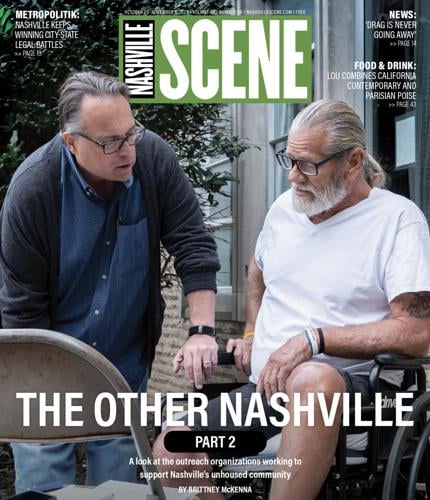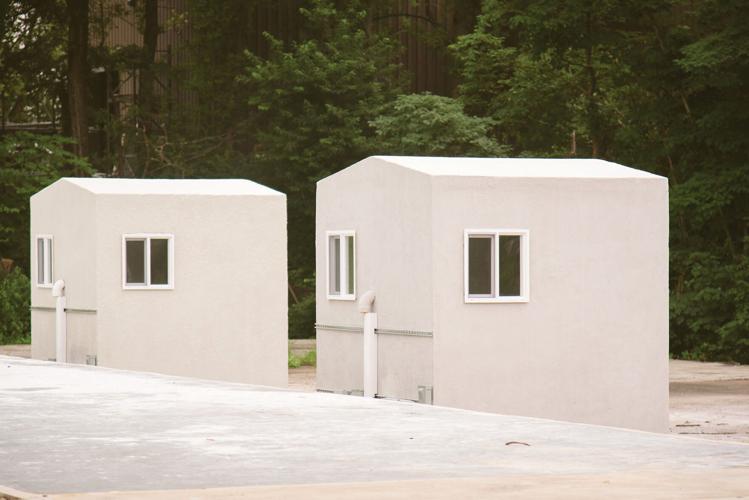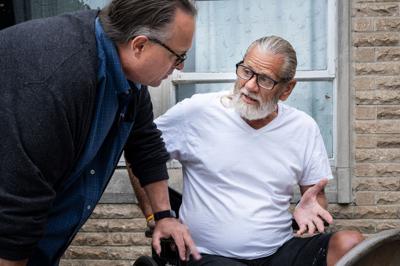The Rev. Jay Voorhees emailed to say he was running late.
The lead pastor at City Road Chapel Methodist Church in Madison had agreed to chat with the Scene in his book-filled office on a Wednesday morning in October, but two more urgent matters came up unexpectedly.
First, he needed to preside over burial ceremonies for the Call the Name project, which he founded. Part of Nashville’s Indigent Burial Program, Call the Name provides dignified, compassionate burials for deceased Davidson County residents who otherwise would or could not have a service, whether due to financial difficulties or having no known surviving loved ones.
Voorhees knew about this the night before, but Wednesday morning he received another plea for help: a call from a congregant whose spouse was suffering a medical emergency. He took them to the hospital and made sure they received proper care, updating their spouse, who was stuck at work, via phone. At press time, the congregant was recovering well.
All this before 11 a.m., and Voorhees was early to our interview.
Meeting the Scene at a back door of City Road Chapel, Voorhees was immediately faced by a person in crisis. Their partner was in jail, they said, and they had nowhere to go. They’d heard City Road could help with urgent needs. Voorhees calmly guided them upstairs, where a staffer would enter them into Metro’s Homeless Management Information System, the city’s primary database on homelessness.
Then we’d sit down for an hour-plus chat spanning affordable housing policy, creative outreach solutions, finding common ground among conflicting ideologies and more.
If you think Voorhees sounds like some kind of superhuman, you aren’t alone. He has many fans in and around Madison who are grateful for the faith and outreach communities he and his staff at City Road provide. What’s truly remarkable about Voorhees, though, is that he isn’t superhuman. He’s a mortal man with a family and a regular life, with family photos and coffee-table books compiling humorous church signs dotting his office.
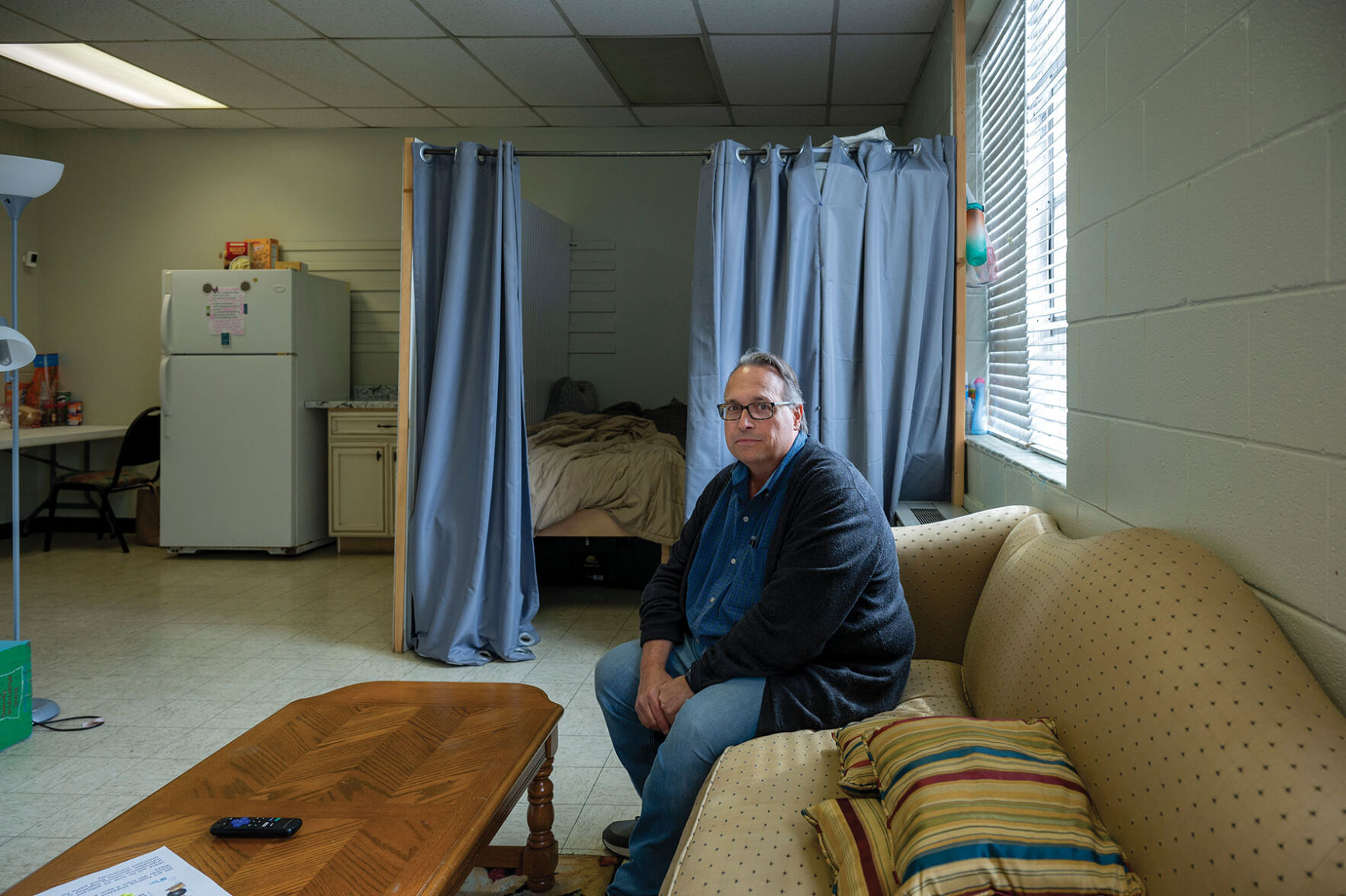
The Rev. Jay Voorhees sits in City Road Chapel Methodist Church’s transitional housing
What sets Voorhees apart is his willingness to put his money where his mouth is — or in church parlance, to practice what he preaches. Since coming to City Road in 2014, Voorhees has grown the church’s offerings to people experiencing homelessness to include basic needs like laundry services and hot showers as well as a fully operational transitional shelter, which opened two years ago and can house up to 15 people while they wait for permanent housing.
It’s a lot for one man and his small church, which he says sees “60 to 75 people on a Sunday morning” and has an annual budget of $350,000, “most of which is for just the operations of building.” Long odds or not, City Road is the epicenter of the homeless community in Madison, also serving as home base for organizations like Open Table Nashville and The Beat.
The very same morning Voorhees speaks to the Scene, David Wooten and his wife are catching up with friends in the church parking lot. They’re particularly excited, because after a year of waiting they will soon move out of the shelter system and into housing. Wooten, who is in a wheelchair, has been camping on the back side of City Road — the building, well-loved but in need of updating, is not accessible — while his wife stayed in the shelter.
Voorhees notes that Wooten’s temporary accommodations were far from ideal, but still provided a safe and consistent shelter, one that — crucially — was close to his wife and the rest of his community.
David’s shelter is also emblematic of Voorhees’ approach to helping people experiencing homelessness. Like many people working to alleviate homelessness in Nashville, Voorhees understands the importance of creativity, flexibility and on-the-fly thinking, particularly as the housing crisis continues to grow unchecked.
During the recent mayoral election, few issues elicited more passion among potential voters than Nashville’s need for affordable housing. Part of Mayor Freddie O’Connell’s winning campaign included “15 Fixes on Day One,” a list of issues he planned to address as soon as he took office. One of those fixes is the creation of an Office of Housing, which, as O’Connell’s campaign site describes, would “work closely with data from the new Office of Homeless Services that [he] worked to create as a Councilmember to ensure that our housing strategies are inclusive of all incomes and abilities — and with our transportation planners — because housing affordability and transportation go hand-in-hand.”
Many working in homeless outreach, including Voorhees, are eager to see what housing and homelessness policy will look like under Mayor O’Connell, who took office one month ago.
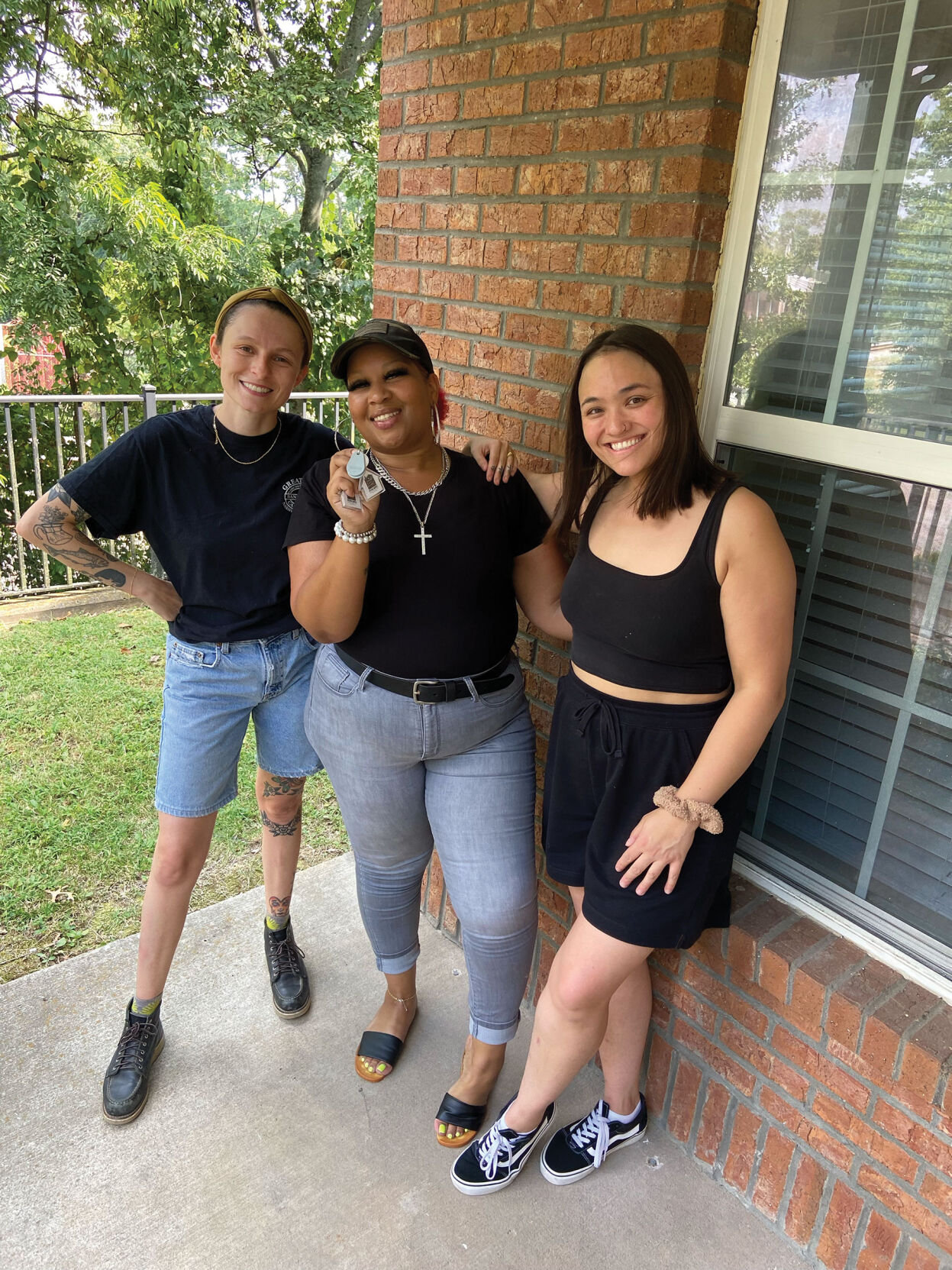
Open Table employees India Pungarcher (left) and Kelly Chieng (right) with Kiara as she moves into housing
India Pungarcher, advocacy and outreach specialist at nonprofit Open Table Nashville, tells the Scene she hopes to see, among other changes, more transparency from Metro, both in interacting with advocacy organizations and in presenting information about housing and homelessness to the public. She shares that many people working in homeless outreach simply wish to hear Metro entities acknowledge the housing crisis for what it is, rather than using soft or sugar-coated language to appease citizens. Pungarcher believes that before the problem can be solved, everyone must agree that there is, in fact, a problem.
“I don’t think it’s something that we’re allowed or encouraged to be honest about,” Pungarcher says. “Every time we try to point out how big of a deficit of housing we’re in, we get kind of chastised and scolded by Metro, like we’re only supposed to think of the positive and the good work we’re doing. And I think that’s really hard, because I think it takes away, again, from how deep we are in this crisis. … Our housing crisis affects every single person in this city in some way: every Metro worker, whether it’s in MNPS, it’s the fire department, it’s our EMS, or our police. Every single person is affected by this issue.”
Voorhees expressed a similar sentiment a few days earlier, saying, “I don’t want us to be negative. But I want to be honest about the limitations that we have.”
O’Connell tells the Scene that increased communication, both between stakeholders and to the public, is a priority for him, and has been since the two years he spent as part of the Homelessness Commission and, later, the Homelessness Planning Council.
“My hope is that we see increasing alignment now across the mayor’s office, Office of Homeless Services, the Planning Council and our Continuum of Care,” he tells the Scene. “The use of American Rescue Plan Act funding should mean we have some sense of success with the oversight process built into that, and the Planning Council just approved a refreshed strategic community plan that we can use to benchmark success over the next three years.”
Voorhees and Pungarcher agree that greater collaboration between Metro entities, advocacy groups and other stakeholders is another important goal, as different providers could focus on one or two specialties rather than stretching themselves thin trying to be a one-stop shop for a deeply complex issue.
“From my perspective — and I will fully confess that I don’t know everything that goes on in the machinations of the homeless services community — but it feels to me like there really has got to be a more collaborative approach to dealing with it,” Voorhees says. “None of us can deal with this on our own. And we need to support each other.”
Both Voorhees and Pungarcher see a dire need for a system that can offer support to a person not just until they are placed in permanent housing, but for as long as it takes for them to achieve true stability, whether for mental health needs, for help kicking substance abuse, for finding employment or for the myriad other contributors to the retention of stable housing.
“There are a lot of folks who are doing street outreach or doing housing navigation,” says Pungarcher, “but the retention piece of making sure that you have the resources and capacity to ensure that people are able to maintain their housing, that’s something that, historically as a city, we haven’t done a great job of investing in.”
“My hope is that we could really develop a system that works,” Voorhees says. “My experience right now is that we have lots of different organizations doing lots of different stuff. And it’s all good stuff. And it’s all involving people that are committed to helping other people. But I continue to feel like we don’t really have a comprehensive system with protocols in place that allow for handoff and communication.”
This lack of a system allows people to fall through the cracks more easily, particularly, as Pungarcher notes, the growing number of clients who get housing only to lose it a year or two later — often, as development continues to surge, due to rising rent costs or changes in building ownership. It also creates burnout among nonprofit employees who don’t have the time or resources to provide the degree of help the crisis demands.
“They’re getting eviction notices, or notices that their lease isn’t going to be renewed,” she explains. “So then we’re scrambling to find housing for the same people that we thought we solved it for. We thought we made it.”
Pungarcher shares an anecdote about someone she’d placed in housing who recently received a notice from his landlord saying he would be evicted in 15 days if certain lease violations, like bringing an unauthorized friend onto the property, weren’t rectified. The resident was confused by the notice and believed he was being evicted immediately, so he frantically contacted Pungarcher.
“I was like, OK, let’s take a step back,’” she says. “‘If we read this letter, it says you’re not getting evicted. We have 15 days to rectify the situation. Let’s go meet with the landlord and go to the office.’ So we’re doing that today. But what if someone didn’t have someone on their side and got this letter? He was ready to just leave his apartment. And also, I don’t know what this conversation is going to be like with this landlord today. I’m not sure if they’ve already made up their mind or if they’re going to hear him out.”
O’Connell points to the distinction between a “housing first” model, which focuses on getting individuals into housing and can neglect next steps, and a services model, saying his administration is poised to enact the latter.
“‘Housing first,’ as a model, relies on stable access to housing without worrying as much about a person’s overall condition as they became unhoused, so the services model is supposed to focus on preventing a return to homelessness,” he says. “Thanks to Mayor Cooper’s investment — which I supported on the Metro Council — we do have significant short-term funding for supportive services, and some of those we’ll want to target to people who are entering housing from encampments and other challenging conditions.”

3D-printed shelters pilot in Chattanooga
Short-term thinking will be critical. While building new affordable housing is a necessary goal, doing so will take time, likely years, while the number of people living on the streets continues to grow. Pungarcher says Open Table is constantly trying to find innovative, cost-effective ways to stretch its resources. She and another staffer visited Chattanooga over the summer to see some of the initiatives Mayor Tim Kelly has implemented since taking office in 2021. One of those projects is a temporary sanctioned homeless encampment with adjacent amenities like kitchen appliances and a pantry.
One of the first people Pungarcher met on their visit was a resident of the encampment who told her: “I’ve been sober since I got here. And if I wasn’t here, I’d probably be dead. I have a support system. I stopped drinking. If I have to leave here, I know I’m going to lose my sobriety. If I can’t stay here, I’m not going to work on housing, because I trust the people that are here running it. They have my back, and they’re going to get me living somewhere that I want.”
Asked about navigating the short-term while planning for longer range goals, O’Connell shares that Metro’s first permanent supportive housing (PSH) project is “almost complete,” with “a near-term goal … to ensure that we get people moved in and set up the service model for long-term success.” Another near-term priority, as O’Connell sees it, is “to understand whether the public-private model to incentivize market developments to include PSH has worked since funding was made available.”
“And our goal with our Homeless Management Information System improvements has been to become more competitive for federal HUD funding,” he adds. “So, we will have some sense of that over the next few years, as we hope to transition our collaborative applicant from MDHA to the Office of Homeless Services to keep better alignment with providers and people with lived experience. Our data is as good as it’s ever been, so tracking the broader goal of reducing chronic homelessness should be easier than ever before.”
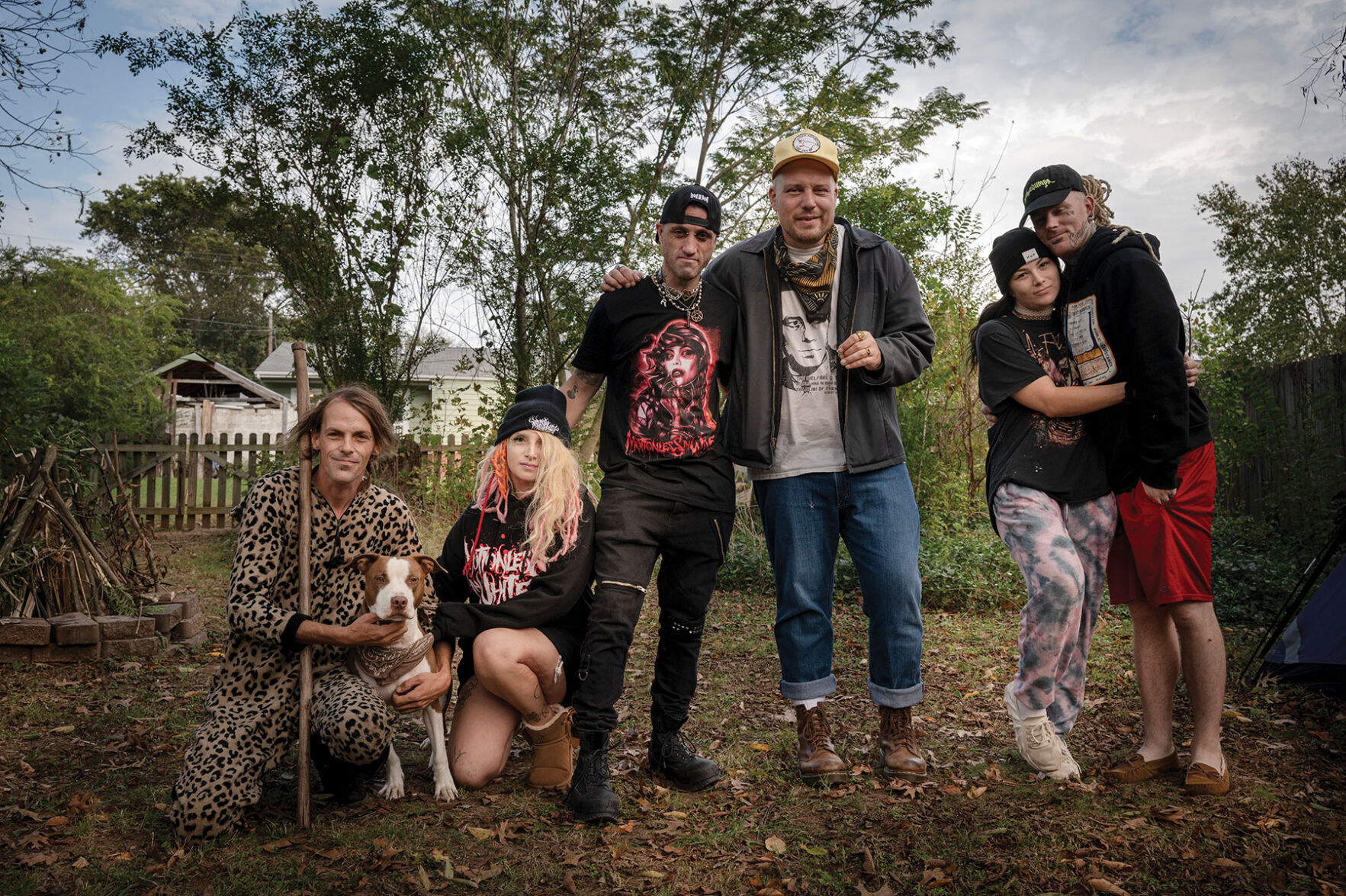
Darrin Bradbury (third from right) with some of the people The Beat helps
In April, the Scene spent time in Madison meeting and getting to know a number of people experiencing homelessness in the area. I met a staggering number of folks who were willing to share difficult, often harrowing stories thanks to the presence of Darrin Bradbury, who at the time operated under the pseudonym “Mother Hubbard.”
Bradbury has spent most of 2023 doing outreach work in his Madison neighborhood, and earlier this year he turned his venture into The Beat, a 501(c)3 organization providing on-the-ground outreach and assistance to Madison’s growing unhoused population. He agrees with Voorhees’ and Pungarcher’s assertions that transparency, collaboration and creativity are integral to alleviating the homelessness crisis.

The Rev. Jay Voorhees (left) and David Wooten at City Road Chapel Methodist Church in Madison.
He personally also sees a lack of communal housing as a missed opportunity for getting people off the street. This is something especially close to Bradbury’s heart, as he’s opened his own home to people he’s met through his outreach work in Madison. One couple in particular has found stability while living with Bradbury — hours after being photographed for the Scene cover story, both overdosed and nearly died. They now share a room in Bradbury’s home and are working toward finding stable employment and permanent housing.
“Communal housing needs to be part of the conversation,” Bradbury says. “And how communal housing is different from transitional housing is that it can be permanent. It can be transitional, too. It can be whatever you need it to be. And we have found through some beta testing of our own ideas that it’s really effective in keeping people sheltered, housed and supported.”
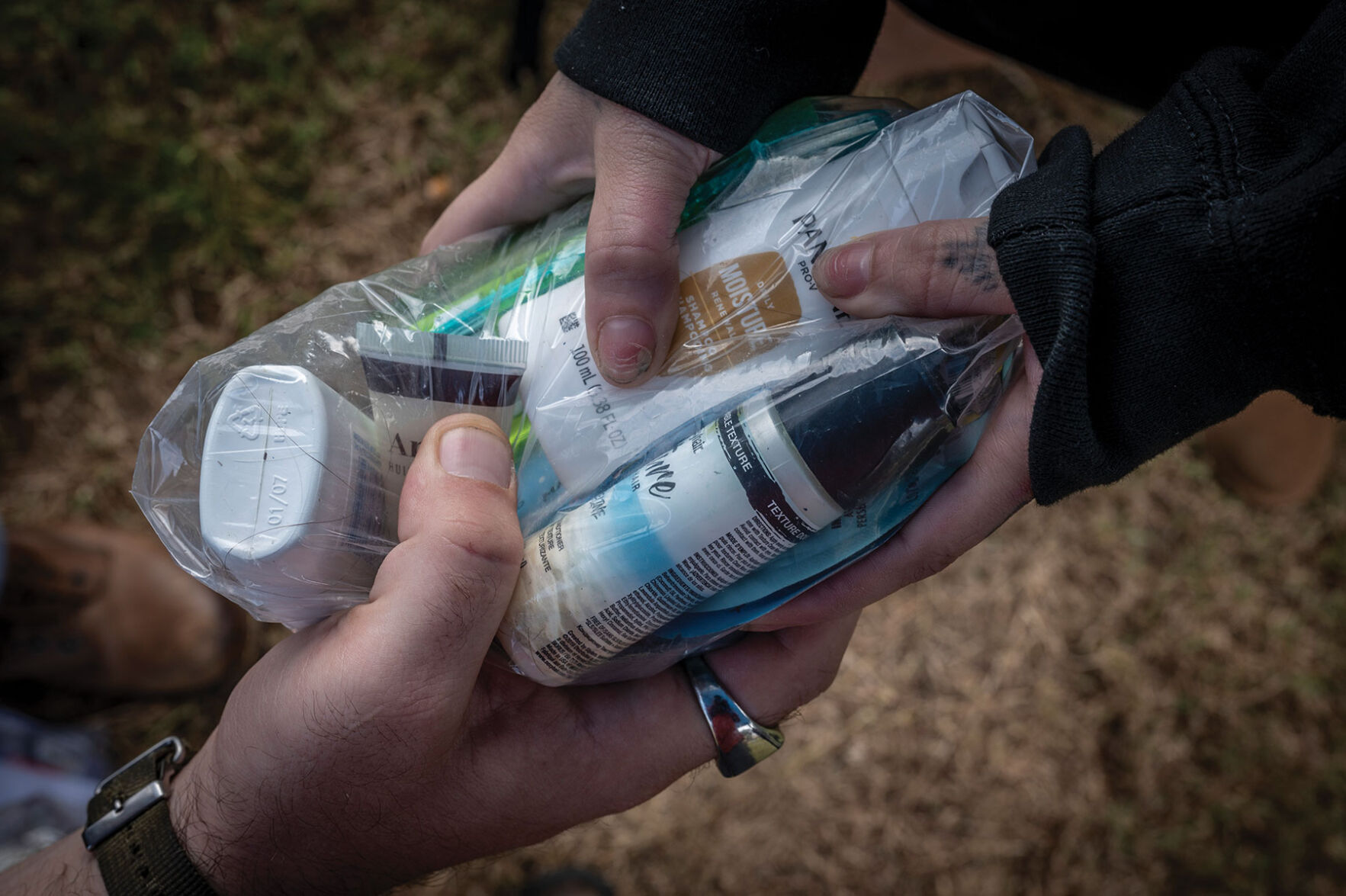
Toiletry supply package for the unhoused
Bradbury also sees a racial element in the way homelessness is addressed, sharing how neighbors around City Road only began complaining about people sleeping in their cars in the church parking lot when a Black man began sleeping there too.
“We had a bunch of white folks sleeping in their cars,” he says. “And then we brought this one Black man around, and all of a sudden the complaints just started coming in. I can personally attest that this man’s behavior was no different than anybody else that was sleeping back there. And I give a tremendous amount of credit to Jay, who put up with those complaints for an extremely long time based on the same sentiment of, like, this is obviously a race issue within the neighborhood.”
Pungarcher notes that the city’s focus on reaching out to people camping outdoors creates racial inequity, as people of color are far less likely to live in encampments due to fears of arrest or harassment.
“If you go to North Nashville, homelessness looks different there,” Pungarcher says. “There’s not as many camps, but there are lots of walkers and folks that are doubling up or staying in abandoned buildings. And you have folks who have lived at the Mission for probably years. We don’t have the same priority of getting folks out of shelters who maybe can’t stay on the street, because, if they did, they’re gonna get the cops called, and that could be dangerous or life-threatening.”
Through his outreach work, Bradbury met Laura Knotts, president of the Madison-Rivergate Chamber of Commerce. The two quickly bonded over a desire to mitigate the growing homelessness crisis in Madison, with Knotts’ hope for the area to be developed equitably dovetailing with Bradbury’s mission of helping the underserved.
Knotts tells the Scene that the chamber has a vested interest in helping alleviate the homelessness crisis, though her resources to do so are limited. Knotts is currently the chamber’s only staffer, but she says she hopes to hire part-time help in the coming months. She has connected with both Bradbury and Voorhees to discuss creative ways to treat unhoused people with compassion while also honoring her commitments to business-owner clients.
“One of the things I hear a lot from our businesses is, ‘How do we handle the issue of homelessness?’” Knotts says. “Sometimes they’re having to deal with mental health issues, and sometimes they’re having to deal with substance abuse issues. And they’re trying to balance kindness with the comfort of their customers and their employees. So it’s a really difficult balance that all of our businesses are facing. That is just one of the reasons why we are so keen to work with Jay and Darrin to try to find a unique solution.”
Knotts sees doable solutions for both short- and long-term needs. In the long term, she’d love to see more shelters and transitional housing options actually in the Madison area, as she explains: “A lot of our advocacy groups are located in Madison. So it doesn’t help to send somebody to the Mission [downtown], far away from where all of their advocacy groups are trying to help them.”
Voorhees makes this same point, noting that many people seeking shelter — in Madison but throughout the rest of the city as well — benefit substantially from being able to stay with loved ones and friends, and that even the sense of home provided by being in a specific area can bring added stability to their lives.
“They need to feel safe, in addition to the community around them feeling safe,” Knotts says. “It’s Maslow’s hierarchy of needs. If you’re scared for your well-being, how can you concentrate on holding down a job?”
And speaking of holding down a job, one shorter-term though no doubt complex solution that Knotts believes could help in Madison is second-chance employment — very few jobs are available to people with felony charges on their records. She also hopes to see more housing that accepts residents with felony charges.
“What we really need is more housing that is available for felons,” she says. “We need more people to consider being second-chance employers. Because if you get housing, you have to have a job to be able to maintain that housing. In the middle of a staffing crisis, like a lot of our companies are going through, being a second-chance employer could be a solution to that.”
O’Connell’s administration cannot overhaul housing and homelessness in Nashville overnight — or likely even within one term — but this change in leadership presents a sorely needed opportunity to decide how Nashville will grow and who gets to be part of it. Voorhees sums up a sentiment I heard, phrased one way or another, in each conversation I had for this piece.
“I would like to see [Mayor O’Connell] have a much more active role in leadership around homeless services,” Voorhees says. “I think he’s going to need to show up in the room and say, ‘What are we doing?’ And that’s not just him going to his staff at the Office of Homeless Services. That’s going to be him meeting with organization heads and saying, ‘Look, we’ve got to figure out how to make this work.’ Because otherwise, we’re all just going to be spinning our wheels.”

